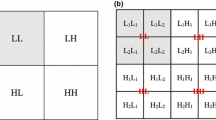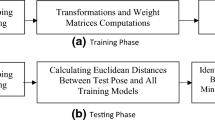Abstract
This paper proposes a novel human face recognition system using curvelet transform and Kernel based principal component analysis. Traditionally multiresolution analysis tools namely wavelets and curvelets have been used in the past for extracting and analyzing still images for recognition and classification tasks. Curvelet transform has gained significant popularity over wavelet based techniques due to its improved directional and edge representation capability. In the past features extracted from curvelet subbands were dimensionally reduced using principal component analysis for obtaining an enhanced representative feature set. In this work we propose to use an improved scheme using kernel based principal component analysis (KPCA) for a comprehensive feature set generation. KPCA performs a nonlinear principal component analysis (PCA) using an integral kernel operator function and obtains features that are more meaningful than the ones extracted using a linear PCA. Extensive experiments were performed on a comprehensive database of face images and superior performance of KPCA based human face recognition in comparison with state-of-the-art recognition is established.
Preview
Unable to display preview. Download preview PDF.
Similar content being viewed by others
References
Turk, M.A., Pentland, A.P.: Face Recognition using Eigenfaces. In: Proc. Computer Vision and Pattern Recognition, pp. 586–591 (1991)
Chow, G., Li, X.: Towards a system for automatic facial feature detection. Pattern Recognition 26(12), 1739–1755 (1993)
Zhao, W., Chellappa, R., Rosenfeld, A., Phillips, P.J.: Face Recognition: A Literature Survey. In: ACM Computing Surveys, pp. 399–458 (2003)
Goudail, F., Lange, E., Iwamoto, T., Kyuma, K., Otsu, N.: Face recognition system using local autocorrelations and multiscale integration. IEEE Trans. Pattern Anal. Mach. Intell. 18(10), 1024–1028 (1996)
Valentin, D., Abdi, H., O’Toole, A.J., Cottrell, G.W.: Connectionist models of face processing: A Survey. Pattern Recognition 27, 1209–1230 (1994)
Swets, D.L., Weng, D.L.: Using discriminant eigenfeatures for image retrieval. IEEE Trans. Pattern Anal. Mach. Intell. 18(8), 831–836 (1996)
Kirby, M., Sirovich, L.: Application of the Karhunen-Loeve procedure for the characterizati-on of human faces. IEEE Trans. Pattern Anal. Mach. Intell. 12, 103–108 (1990)
Pentland, A., Moghaddam, B., Starner, T.: View-based and modular eigenspaces for face recognition. In: Proc. IEEE Conf. Computer Vision and Pattern Recognition, Seattle, pp. 84–91 (1994)
Feng, G.C., Yuen, P.C., Dai, D.Q.: Human Face Recognition using PCA on Wavelet Subband. Journal of Electronic Imaging 9(2), 226–233 (2000)
Mandal, T., Wu, Q.M.J.: Face Recognition using Curvelet Based PCA. In: ICPR (2008)
Candès, E.J., Demanet, L., Donoho, D.L., Ying, L.: Fast discrete curvelet transforms. In: Multiscale Model. Simul., pp. 861–899 (2005)
Starck, J.L., Elad, M., Donoho, D.L.: Redundant multiscale transforms and their application for morphological component analysis. Advances in Imaging and Electron Physics 132, 287–342 (2004)
Cover, T.M.: Geometrical and Statistical Properties of Systems of Linear Inequalities with Applications in Pattern Recognition. IEEE Transaction on Electronic Computers 14(3), 326–334 (1965)
Scholkopf, B., Smola, A., Muller, K.R.: Nonlinear component analysis as a kernel eigenvalue problem. Neural Computation 12(5), 1299–1319 (1998)
Boiman, O., Shechtman, E., Irani, M.: In Defense of Nearest-Neighbour Based Image Classification. In: IEEE Conference on Computer Vision and Pattern Recognition (CVPR) (June 2008)
Author information
Authors and Affiliations
Editor information
Editors and Affiliations
Rights and permissions
Copyright information
© 2009 Springer-Verlag Berlin Heidelberg
About this paper
Cite this paper
Mohammed, A.A., Minhas, R., Wu, Q.M.J., Sid-Ahmed, M.A. (2009). A Novel Technique for Human Face Recognition Using Nonlinear Curvelet Feature Subspace. In: Kamel, M., Campilho, A. (eds) Image Analysis and Recognition. ICIAR 2009. Lecture Notes in Computer Science, vol 5627. Springer, Berlin, Heidelberg. https://doi.org/10.1007/978-3-642-02611-9_51
Download citation
DOI: https://doi.org/10.1007/978-3-642-02611-9_51
Publisher Name: Springer, Berlin, Heidelberg
Print ISBN: 978-3-642-02610-2
Online ISBN: 978-3-642-02611-9
eBook Packages: Computer ScienceComputer Science (R0)




